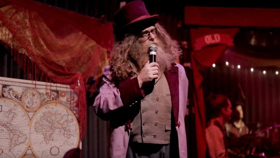Interview: Ben Caplan Sings a Human Tale in OLD STOCK: A Refugee Love Story

OLD STOCK: a refugee love story, is a concert-theater hybrid that explores the dark realities of love set in 1908 Halifax, Canada. Based on the experiences of playwright Hannah Moscovitch's great-grandparents who fled Romania, OLD STOCK is a rousing experience, with Klezmer influences inhabiting the score. It's both visually and aurally arresting.
"It's more of a musical experience than a play," said Ben Caplan who portrays the omniscient Wanderer and bandleader who sets the stage for the universal tale threaded by death, despair and ultimately, hope.
This production defies pigeon-holing. The fable revolves around Chaim (Chris Weatherstone) and Chaya (Mary Fay Coady), who meet while awaiting medical clearance in Halifax after their arrival in Canada.
Coady plays the violin when not breathing life and love into a saddened character. Besotted Chaim adores Chaya and needs to convince her that their marriage would be a blessing. Weatherstone works the woodwinds when not pining for Chaya.
Graham Scott is on the keyboard and accordion, and Jamie Kronick plays percussion. The troupe is on stage for the duration of the 80-minute, intermission-less performance.
What informs the Wanderer? "Asking what makes him tick is like trying to dance about painting," Caplan, whose ancestors were also Canadian immigrants, said with a laugh. "It's a tough question to answer. He's mischievous, an all-knowing provocateur.
"His goal is to coax the audience along on this love story and make them feel comfortable, with a little menace," Caplan said. It's not an easy journey, replete with vivid references to Jewish pogroms a hundred years ago. The term Old Stock refers to a comment made by Stephen Harper, then the Canadian prime minister, who was drawing a distinction between refugees and "old stock" Canadians.
"The story is a Jewish immigrant story and is about normalizing the otherness," Caplan said.
Old Stock is produced by 2B Theatre Company, a Halifax-based, internationally acclaimed company that creates work for regional, national and international stages.
Caplan is the concert master of ceremonies who reveals the fable's tragic and light-hearted threads. He's prone to singing about lust and love utilizing colorful metaphors, while at the same time honoring human love. "For me, the dance is between the profane and the sacred," Caplan said of euphemisms that include The Forbidden Polka and Four-Legged Foxtrot.
Collaborating with Moscovitch and Christian Barry, who directs, was exhilarating. "It was a wonderful experience," Caplan said. "We did tons and tons of collaborating with the writing, more than with putting a live show on," he said.
Caplan is best known as a singer-songwriter and musician. He's released two albums to critical acclaim and tours with his band in 28 countries. "I'm more of a private creator, so it was neat to be pushed," Caplan said. "And as co-writer, Christian gave me the space to be the solitary writer when I needed to be.
"Christian is the primary architect of the show," said Caplan. "It's been his vision that's grounded us. He's like a fulcrum."
Though best known as a songwriter, Caplan's earliest experiences as a performer were in the theater. He's spent many years training, performing and directing before leaving it behind to concentrate on music. This production is his return to theater after 10 years.
"I think this show plumbs the depths of trauma and interpersonal conflicts of what it means to have experienced horrific personal tragedies," Caplan said. "It goes deep inside the tragedies and explores how life after suffering is possible.
"It's very self-deprecating, absurd and humorous. It does end on a note that happiness is possible," he added.
Old Stock shows us that we have to have a sense of humor about life, or there's little point to go on. "We can't control evil," he said.
The parallels between 1908 Halifax and 2018 all over the world, isn't lost on Caplan. "There are currently 65 million refugees in the world today. Knowing that was important for motivation," he said. "We wanted to find a story that's personal and people can access authentically while also thinking about the universal."
Caplan hopes audiences find it easier to relate to unknown refugees after experiencing a performance. "I think the conveying of humanity in contemporary times is a challenge. It's easy to not think about refugees as having hopes and dream and family," Caplan said
"It's not just about a bunch of hooligans," he said. "That's not a true collection of individuals. Refugees are not a mass of people. They're individuals with their own stories."
To say the Wanderer is a vibrant spirit is a vast understatement. He sings, he dances, he appears and disappears and runs into the audience. "I keep it fresh because it's about living in the moment and trying to forget everything else," Caplan said. "It would be easy after so many repetitions to go on auto-pilot.
"But it gets tiresome to do that. If you're not even there, you're not with the audience. I'm always in the moment. It's very gratifying.
'I hope more than anything people understand the sense of humanity we present," Caplan said. "People who are forced to leave their homes are just like us. We're all people."
Old Stock: a refugee love story, is playing at 59E59, 59 East 59th Street, Theater A through April 22.
Comments

Videos

